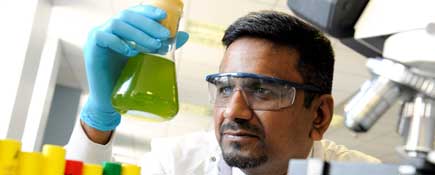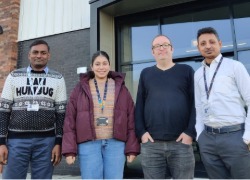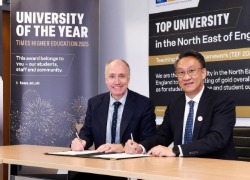International boost for innovative Teesside start-up TeeGene Biotech
A Teesside University spin out company which has developed a ground-breaking way of growing ‘soap’ from bacteria has been involved in an international project to stimulate the growth of the bio-based economy in North West Europe.

TeeGene Biotech, based at the Wilton Centre in Redcar, was one of a small number of companies to benefit from and provide expertise to the three-year, £55million Bio Base North West Europe project.
Co-financed by the INTERREG IVB programme of the European Union, the network of bio-based economy experts advised over 500 small and medium enterprises to facilitate innovation and business development in bio-based technologies and stimulate the growth of the bio-based economy in North West Europe.
TeeGene Biotech has developed innovative ways to extract high-value chemicals from algae, plants and microorganisms. In particular, the company has found ways to develop biosurfactants, which act like soap and help to emulsify different liquids, from strains of bacteria.
It was one of the 27 SMEs to receive financial support through the Bio Base North West Europe project to conduct feasibility studies and scale-up trials at the Bio Base Europe Pilot Plant in Ghent, Belgium.
The biobased economy provides many opportunities for Europe, with biobased feedstocks, rather than imported fossil resources, used to produce materials, chemicals and energy, creating a new knowledge and technology intensive economy with high employment potential and with reduced environmental impact.
TeeGene Biotech carried out tech transfer work at the Bio Base Europe Pilot Plant using its bioprocess platform based on carbohydrates and it also received funding to validate its technologies at the Belgian plant and scale them up to an industrial level.
Dr Pattanathu Rahman, Founder of TeeGene Biotech and a Senior Lecturer in Chemical/Process Engineering at Teesside University, said: 'It is an immense help for start-up companies like ours to conduct feasibility studies to prove our technology platform. Experts at the Bio Base Europe Pilot Plant brought new insight into our business prospective and uncovered many challenges we had been facing for two years in the process development.
'The biosurfactant scale-up work was very successful, and made us confident that we can manufacture biosurfactants at an industrial level. We are now looking into the possibility to build our own pilot line.'
 Groundbreaking project to unlock nuclear energy's role in
...
Groundbreaking project to unlock nuclear energy's role in
... Start the new year by expanding your knowledge
Start the new year by expanding your knowledge  Teesside University strengthens long-standing partnership
...
Teesside University strengthens long-standing partnership
...